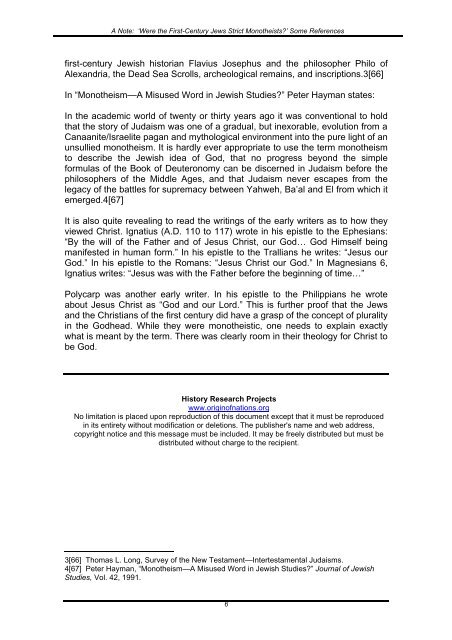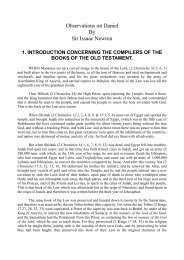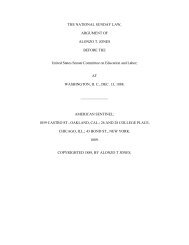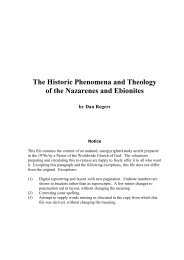Jews and Binitarianism.pdf - Friends of the Sabbath Australia
Jews and Binitarianism.pdf - Friends of the Sabbath Australia
Jews and Binitarianism.pdf - Friends of the Sabbath Australia
Create successful ePaper yourself
Turn your PDF publications into a flip-book with our unique Google optimized e-Paper software.
A Note: ‘Were <strong>the</strong> First-Century <strong>Jews</strong> Strict Mono<strong>the</strong>ists?’ Some References<br />
first-century Jewish historian Flavius Josephus <strong>and</strong> <strong>the</strong> philosopher Philo <strong>of</strong><br />
Alex<strong>and</strong>ria, <strong>the</strong> Dead Sea Scrolls, archeological remains, <strong>and</strong> inscriptions.3[66]<br />
In “Mono<strong>the</strong>ism—A Misused Word in Jewish Studies?” Peter Hayman states:<br />
In <strong>the</strong> academic world <strong>of</strong> twenty or thirty years ago it was conventional to hold<br />
that <strong>the</strong> story <strong>of</strong> Judaism was one <strong>of</strong> a gradual, but inexorable, evolution from a<br />
Canaanite/Israelite pagan <strong>and</strong> mythological environment into <strong>the</strong> pure light <strong>of</strong> an<br />
unsullied mono<strong>the</strong>ism. It is hardly ever appropriate to use <strong>the</strong> term mono<strong>the</strong>ism<br />
to describe <strong>the</strong> Jewish idea <strong>of</strong> God, that no progress beyond <strong>the</strong> simple<br />
formulas <strong>of</strong> <strong>the</strong> Book <strong>of</strong> Deuteronomy can be discerned in Judaism before <strong>the</strong><br />
philosophers <strong>of</strong> <strong>the</strong> Middle Ages, <strong>and</strong> that Judaism never escapes from <strong>the</strong><br />
legacy <strong>of</strong> <strong>the</strong> battles for supremacy between Yahweh, Ba’al <strong>and</strong> El from which it<br />
emerged.4[67]<br />
It is also quite revealing to read <strong>the</strong> writings <strong>of</strong> <strong>the</strong> early writers as to how <strong>the</strong>y<br />
viewed Christ. Ignatius (A.D. 110 to 117) wrote in his epistle to <strong>the</strong> Ephesians:<br />
“By <strong>the</strong> will <strong>of</strong> <strong>the</strong> Fa<strong>the</strong>r <strong>and</strong> <strong>of</strong> Jesus Christ, our God… God Himself being<br />
manifested in human form.” In his epistle to <strong>the</strong> Trallians he writes: “Jesus our<br />
God.” In his epistle to <strong>the</strong> Romans: “Jesus Christ our God.” In Magnesians 6,<br />
Ignatius writes: “Jesus was with <strong>the</strong> Fa<strong>the</strong>r before <strong>the</strong> beginning <strong>of</strong> time…”<br />
Polycarp was ano<strong>the</strong>r early writer. In his epistle to <strong>the</strong> Philippians he wrote<br />
about Jesus Christ as “God <strong>and</strong> our Lord.” This is fur<strong>the</strong>r pro<strong>of</strong> that <strong>the</strong> <strong>Jews</strong><br />
<strong>and</strong> <strong>the</strong> Christians <strong>of</strong> <strong>the</strong> first century did have a grasp <strong>of</strong> <strong>the</strong> concept <strong>of</strong> plurality<br />
in <strong>the</strong> Godhead. While <strong>the</strong>y were mono<strong>the</strong>istic, one needs to explain exactly<br />
what is meant by <strong>the</strong> term. There was clearly room in <strong>the</strong>ir <strong>the</strong>ology for Christ to<br />
be God.<br />
History Research Projects<br />
www.origin<strong>of</strong>nations.org<br />
No limitation is placed upon reproduction <strong>of</strong> this document except that it must be reproduced<br />
in its entirety without modification or deletions. The publisher's name <strong>and</strong> web address,<br />
copyright notice <strong>and</strong> this message must be included. It may be freely distributed but must be<br />
distributed without charge to <strong>the</strong> recipient.<br />
3[66] Thomas L. Long, Survey <strong>of</strong> <strong>the</strong> New Testament—Intertestamental Judaisms.<br />
4[67] Peter Hayman, “Mono<strong>the</strong>ism—A Misused Word in Jewish Studies?” Journal <strong>of</strong> Jewish<br />
Studies, Vol. 42, 1991.<br />
6

















